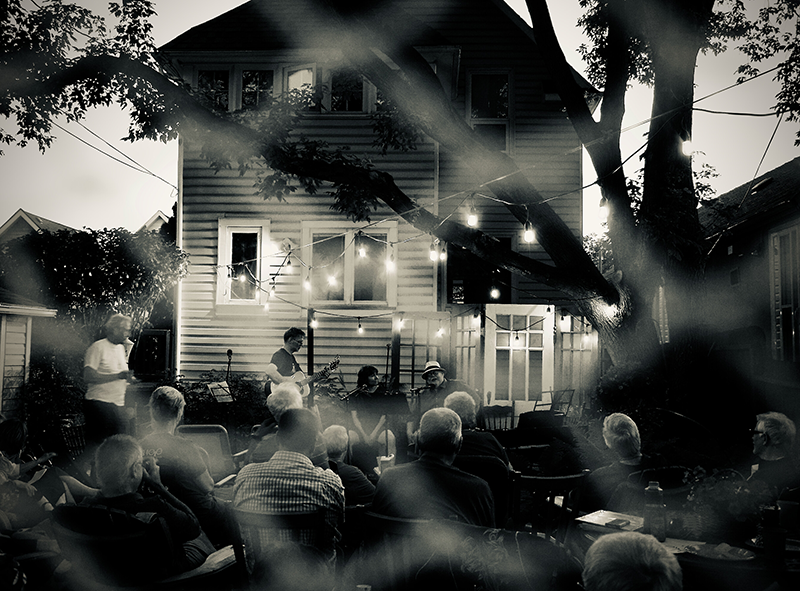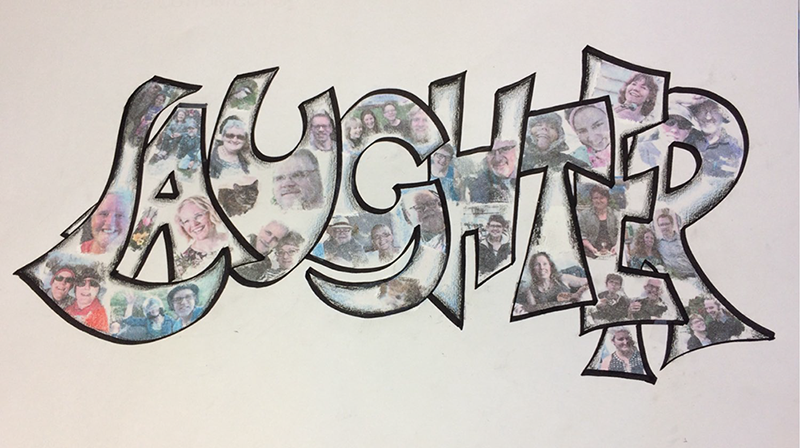Spirit, Learning and Life
Forming character through the insights of literature, contemporary culture and Scripture.
Joyful Happiness: A Spiritual Memoir
by Arthur Paul Patterson
WHEN WAS I truly happy? The happiest time of my life dovetails with the time when I felt the most stress and suffering. With the loss of both my job and my first marriage, 1991 was my Annus horribilis and my most blessed year. That year I discovered what it was to be loved and to love through the lens of God’s compassion and forgiveness.

Image by Lyle Penner
Love was anything but comfortable; it was hard, disciplined work. It was difficult to sustain. Love, as love often does, allowed me to perceive things I never saw before. Love enabled me to see that it has to be given away, funneled into all my relationships. Love made me a more tenderhearted person. I didn’t so much fall in love as fall for the love of God as the organizing centre of my life.
When he encountered love, Thomas Merton said:
Yesterday, in Louisville, at the corner of Fourth and Walnut, suddenly realized that I loved all the people and that none of them were, or, could be totally alien to me. As if waking from a dream—the dream of separateness, of the "special" vocation to be different. My vocation does not really make me different from the rest of men or put me is a special category except artificially, juridically. I am still a member of the human race—and what more glorious destiny is there for man (humans), since the Word was made flesh and became, too, a member of the Human Race!
(Merton’s private journal, March 19, 1958)
Happiness is rooted in personal relationships and lived out in the concrete. It is expansive and inclusive, thrives in stress or peace and results in gratitude. While happiness is said by the ancients to be grounded in virtue, I prefer to say that God-given love is the handmaid of happiness.
"How can we possibly thank God enough for all the happiness you have brought us?"
(1 Thessalonians 3:9)
"I know what it is to be poor or to have plenty, and I have lived under all kinds of conditions. I know what it means to be full or to be hungry, to have too much or too little. Christ gives me the strength to face anything."
(Philippians 4:12-13)
I was happy when I walked through Queen Elizabeth Park in Vancouver in 1982 with a squirming bundle of wrinkled flesh, warmly tucked next to my chest in a green corduroy snugly. Part of my routine was to take my newborn son Sean out for a walk either in the morning or in the evening as the sun was coming up or going down. I lost myself in the beautiful environment. I noticed the shedding of auburn Arbutus tree bark, the sights and smells of flowers and the naturally placed ponds and gardens. I was captivated by beauty, delivered from the clutter of my mind. The freshness of new life took me over. A similar sense of happiness returned many times over the years, even on father-son trips to the comic shop or when exploring the complexity of a role-playing game together. Happiness snuck in even when Sean and I were working on his homework together.
I was happy when I took my step-son Erik for walks in 1992 when Bev hadn’t slept a wink due to his colicky cries. Those cries calmed down when accompanied by the motion of the stroller rolling rhythmically over the concrete streets. A simpler form of happiness often returns when I contemplate animals - dogs (especially roly-poly puppies) or contented, curled up cats. These contemplative visions of creation have allowed me to become self-forgetful. They have led to a special kind of perception of clarity and finally, again, to gratitude.
"I have no greater joy than this, to hear about my children walking in truth.” (3 John 1:4)
I am happy when I see confused and anxious minds, hearts and wills find clarity and a sense of peaceful forgiveness through the enlightenment that comes through Scriptural mentoring. Here I experience a palpable sense of Presence guiding our conversations. A third, wiser partner has joined our conversation. When the Spirit arrives I often notice her presence perceptually, sometimes the way the sun will shine through a window bouncing off a countertop or coffee mug. The difference may come in the lightness of the atmosphere of the room shifting from a heavy melancholy to a relieving spaciousness.
"I will be glad and rejoice in your love, for you saw my affliction and knew the anguish of my soul. You have not given me into the hands of the enemy but have set my feet in a spacious place."
(Psalm 31:7—8)
I am not only happy about the insights others receive but the revelation I overhear as the Spirit communicates between our words of conversation. I feel like laughing because of the mismatch between who I am as a person and the insight that is coming in the Spirit. The fact that there is such a difference at this time does not matter in the least since God has promised to use human weakness for his glory. I see this repeatedly and feel humbled by it. Happiness is born of God’s gift working often in spite of myself to relieve the emotional pain of others. Happiness requires discipline but it is not discipline; happiness requires knowledge but is never fully known.
"Though you have not seen him, you love him; and even though you do not see him now, you believe in him and are filled with an inexpressible and glorious joy..."
(1 Peter 1:8)
"After I spoke they did not speak again, and my word dropped upon them. They waited for me as for the rain, and they opened their mouths as for the spring rain. I smiled on them when they had no confidence, and the light of my face they did not cast down."
(Job 29:22-24)

Image by Bev Patterson
Whether special events and fancy cuisine or just the good o’l summer dogs in the backyard, our eating together mirrors communion and ultimately the celebratory banquet we shall have one day with Christ. There is something distinctly sacramental about these people, this food, and these events that sanctifies the ordinary.
"You give your guests a feast in your house, and you serve a tasty drink that flows like a river." (Psalm 36:8)
"Nehemiah told the people, ’Enjoy your good food and wine and share some with those who didn’t have anything to bring. Don’t be sad! This is a special day for the LORD, and he will make you happy and strong’." (Nehemiah 8:10)
As far as the Greek and Roman moral philosophers were concerned, happiness was considered the chief end of life. Happiness was not that banal quality we take as happiness today; it is not satiation but the fulfillment or flourishing of human beings when they achieve their created intention. Aristotle and the Stoic philosophers were asking, "What is the end or goal of a person?" More crassly, "What is the use of humans?" The unanimous answer in the ancient world was that humans were to be virtuous. If you were virtuous or good, you flourished and were happy. The principal way of life was to live according to nature guided by the principle of self preservation directed to whatever increases your virtue through rationality. The only sphere of influence that the individual had was self-control and regulation.
As I look over the stories of happiness in my life, I’ve realized that the essential ingredient to happiness is participation in the love of God. God is primarily conceived of as a loving father and therefore his love ensures human flourishing through what he has created and is sovereign over. Participating with others in the divine image of God produces theological virtues (faith, hope and love) that surpass human ones (magnanimity, justice and self-control).
"Through these he has given us his very great and precious promises, so that through them you may participate in the divine nature, having escaped the corruption in the world caused by evil desires." (2 Peter 1:4)
Faith tells me that along with others, we live in a lovingly regulated world where, while there are exceptions, there is an amazing consistency and creational provision. When we are not provided for and our culture unravels, we suffer. We suffer because the good gifts of God are dearly missed. Gifts such as love, fellowship, communion, eating, singing, beauty, interpersonal trust and the supernatural empowerment of the Holy Spirit are not mere creature comforts. When these gifts are absent we cry out to a personal God and ask to be empowered by Faith, Hope and Love to continue in the midst of apparent futility.
We do not achieve happiness through self-sufficiency but through a relational dependence on God and interdependence on those whom He has providentially placed in our lives. While you and I are subject to suffering, randomness, death and impermanence, God does not die. Whether we are alive or dead, "If we live, we live for the Lord; and if we die, we die for the Lord. So whether we live or die, we belong to the Lord.” (Romans 14:8). God remains true in his love for us and is a constant source of hope. The ultimate expression of love is giving which at its apex is expressed in God’s willingness to suffer on our behalf in Christ. We therefore model ourselves on this vulnerability and love rather than on the security of principles of rationality.
"This is how God showed his love among us: He sent his one and only Son into the world that we might live through him. This is love: not that we loved God, but that he loved us and sent his Son as an atoning sacrifice for our sins. Dear friends, since God so loved us, we also ought to love one another." (1 John 4:9-11)

Image by Lydia Penner